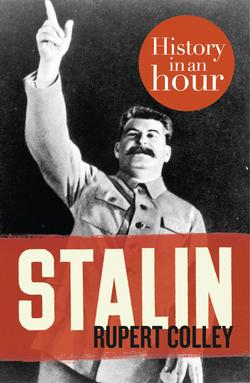Читать книгу Stalin: History in an Hour - Rupert Colley - Страница 8
ОглавлениеStalin the Revolutionary
In 1899, Stalin was expelled from the seminary, supposedly for his Marxist leanings. Having adopted the revolutionary name of Koba, the name of a Georgian Robin Hood-type folk hero, he worked for two years as a clerk at the Tiflis Meteorological Observatory – his only formal job. While working, he became involved in organising strikes, writing articles for socialist newspapers and making revolutionary speeches.
In 1901, avoiding arrest for agitation, Stalin fled to the Georgian coastal town of Batum where the RSDLP encouraged him to stir unrest among the workers of an oil refinery. In February 1902, Stalin helped organise a strike for which he was imprisoned. Having spent eighteen months in jail, he was deported to Siberia, his first of several periods of forced exile.
Stalin aged 23, 1902
In his attempts to avoid the Okhrana, Tsar Nicholas II’s secret police, Stalin adopted several different aliases and was constantly on the move. Yet, between 1902 and 1913, he was arrested six times, each time managing to escape and return west, often travelling on forged documents. The comparative ease of escape – merely hopping onto a westbound train – led to speculation that Stalin was in the employ of the Okhrana as a double agent. He was arrested for the final time in February 1913 and was exiled to various inhospitable parts of Siberia for four years. These years hardened him and made him cynical, the effects of which would be felt years later when he imposed his heartless rule over millions.
Stalin married his first wife, the devout Ekaterina Svanidze, nicknamed Kato, in 1906. To appease his in-laws, Stalin agreed to marry in an Orthodox church. Together they had a son, Yakov, born 18 March 1907, but with Stalin so often absent, busy inciting unrest, his wife and son saw little of their wandering revolutionary. Kato died of typhus in December 1907. She was 22. At her funeral, which, again, Stalin allowed to take place in an Orthodox church, he reputedly said, ‘this creature softened my heart of stone. She’s died and with her have died my last warm feelings for humanity.’ He ignored his son, who was brought up by the Svanidzes. In later years, Stalin ordered the arrest and execution of much of Kato’s family, including, in 1941, her brother, Alexander Svanidze, an old school friend of Stalin’s, who, thirty-five years before, had introduced him to his sister.
In 1907, Stalin participated in the political unrest in the Caspian port of Baku in Azerbaijan. Although he later exaggerated his role in Baku, he was certainly involved in organising strikes and producing a workers’ newspaper, for which he was again arrested, imprisoned and exiled east. A few years later in 1911, Stalin fathered a son by his landlady, Maria Kuzakova, while living in the isolated village of Solvychegodsk. The boy, called Konstantin, never had any contact with Stalin and in 1932 was forced into signing a statement agreeing not to reveal the identity of his father. He was arrested in 1947, accused of being an US spy, but soon released, very likely on the orders of Stalin.
Stalin aged 33, 1912
The RSDLP split into two factions in 1903 – Bolshevik and Menshevik. Stalin, an admirer of the writings of the lawyer and revolutionary, Vladimir Lenin, allied himself to the Bolshevik cause. His work at undermining the Mensheviks within Georgia and his involvement in a number of bank robberies in Tiflis to raise funds for the Bolsheviks, brought him to Lenin’s attention. He first met the Bolshevik leader on 7 January 1906 at a party conference in Tampere, Finland.
Lenin was impressed with Stalin, calling him the ‘wonderful Georgian’. Lenin appointed him to the Bolshevik Central Committee in 1912, although this had to be carried out in absentia as Stalin was serving a jail sentence. It was about this time that Stalin dropped his Georgian alias, Koba, and adopted instead the name Stalin. His birth name, Dzhugashvili, gave away his Georgian roots and was too difficult for his Russian colleagues to pronounce. The Bolsheviks were keen on their tough-sounding pseudonyms: ‘man of steel’ for Stalin; ‘man of stone’ for Lev Kamenev; ‘the hammer’ for Vyacheslav Molotov.
